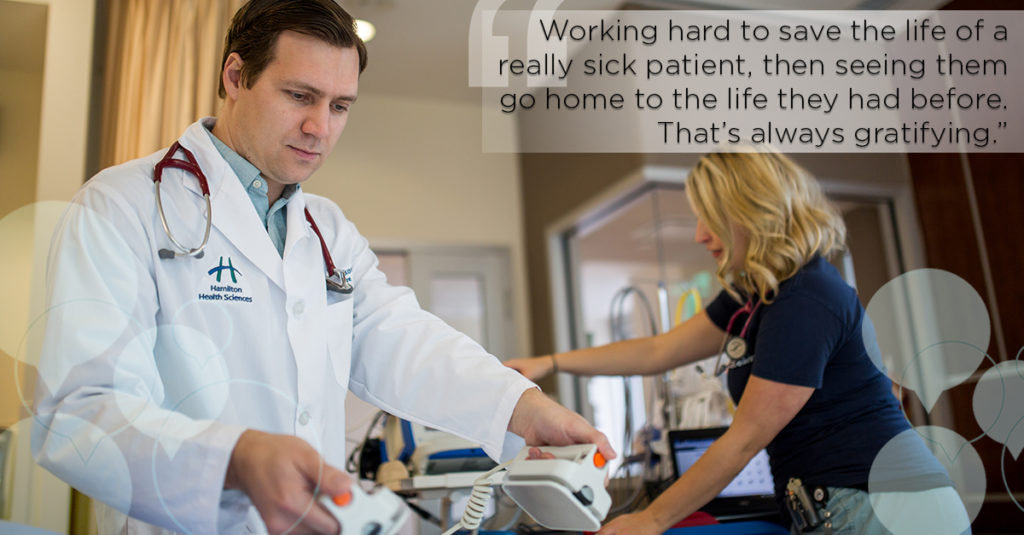
Introducing… an ICU doctor
Dr. Simon Oczkowski is an intensive care unit (ICU) and RACE (Rapid Assessment of Critical Events) team doctor at Juravinski Hospital and Cancer Centre. He has been with Hamilton Health Sciences since 2014.
What do you love most about your role?
Like many of my colleagues here at HHS, I love working on a team. In the intensive care unit, physicians, nurses, respiratory therapists, physiotherapists, social workers, pharmacists, dieticians and other professionals all work together to provide the coordinated care needed by our sickest patients. Everyone brings their own expertise and we are continuously learning from one another. It’s really rewarding when we can make a difference in the lives of patients and families. And, despite the stress of the job, working together with this great group is a lot of fun, too.
What do you find challenging?
One of the things I like most about my role is there is a lot of variety throughout the day. This can also be a challenge. For instance, within the same hour I may round on stable patients; resuscitate a critically ill patient in the emergency department; perform a technical procedure; plan the flow of patients in the ICU; and meet with a family to give them an update on their loved one. Often I am needed in more than one place at the same time. I have to be mindful of the task at hand but also aware of what else needs to be done. It’s a constant challenge.
I don’t think any day can be considered typical. We are always waiting for that emergency call.
Describe a typical day
We usually start off with a handover of issues from the team in the ICU overnight. Then, the multidisciplinary team rounds on all ICU patients—identifying major issues and developing a plan for the day. We’ll often ask ourselves, ‘What do we need to do for the patient in the next 12 hours?’ The ICU being what it is, things are often unpredictable. In a large hospital like Juravinski, anything could happen—a patient stops breathing, they develop septic shock, an overdose, a major bleed, seizures, or even Code Blue calls. We then must bring the patient down to resuscitate them, or go resuscitate them on the ward if they are too sick to be transported. Though we try to have an organized approach to our day, I don’t think any of them can be considered typical. We are always waiting for that emergency call.
Tell us about your most gratifying experience at HHS
Gratifying experiences in the ICU happen in one of two ways. One is to watch a patient who was previously quite sick getting ready to go home, working towards getting back the life they had before. This is always great to see after the team worked hard to try to save that person’s life. Another way is to provide a patient, who won’t recover, and his family compassionate end-of-life care. Helping a family through the process of a loved one’s death can be really gratifying. Our nurses especially develop deep bonds with many patients and families. We all go home on those days feeling a mixture of sadness, but also pride for the care we provided.
What’s one thing people would be surprised to learn about your role?
I think people would be surprised at how much of an ICU doctor’s job doesn’t have that much to do with medicine. The staff in the ICU are so skilled and knowledgeable that much of my role focuses on planning, organization and team management. Obviously I need to have medical expertise and make decisions based upon physiology and evidence-based medicine. But when I started training, I didn’t fully appreciate how much of my job would require other qualities like compassion, communication, leadership and organization. For many doctors, those are as essential as anything else we learn in medical school.
Twitter handle
Follow Simon at @Simon_Ocz.
